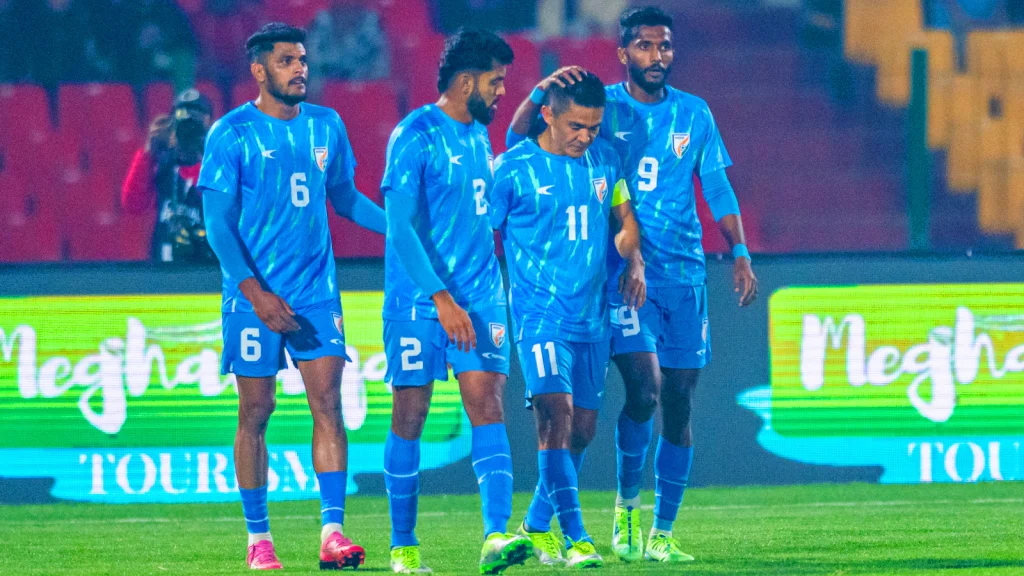By readying itself, for the 2031 AFC Asian Cup, the All India Football Federation has officially come back in the arena for hosting one of Asia’s most esteemed football tournaments.
This decision comes after India’s withdrawal from the bidding process for the 2027 edition under fuzzy circumstances. Renewed interest from India here would stage a good event in showcasing the country’s long-term ambition to become a key player on the global stage in football hosting.
A record seven Expressions of Interest (EOIs) were announced on Friday for the 2031 tournament by the Asian Football Confederation (AFC) – the most number ever for the competition’s modern history.
Others on India’s hopeful numbers for the competition include Australia, Indonesia, South Korea, Kuwait, the United Arab Emirates (UAE), and a combined joint Central Asian bid of Kyrgyzstan, Tajikistan, and Uzbekistan.
From Withdrawal to Return: India Re-Establishes Its Bid
India had for some time been in the last few rounds of contending in the hosting race for the 2027 edition of the AFC Asian Cup, standing neck and neck with Saudi Arabia.
However, to everyone’s surprise, it was announced in late 2022 that AIFF pulled out from the race without a detailed explanation. This effectively left Saudi Arabia as the host nation – a country that is also gearing itself up for 2034 FIFA World Cup.

Critics have condemned the decision to step back in 2022 as having political undertones or as one reflecting the absence of vision, yet India’s comeback for the 2031 edition clearly signifies a renewed intent to elevate its entire football standing in the international arena, and indeed follows the growing wave of infrastructure investment and rising public interest in the sport, primarily through the popularity of the Indian Super League (ISL) and the emerging performance of the national team in continental competitions.
The Growing Prestige of the Asian Cup
The AFC Asian Cup, first held in 1956, has steadily grown its stature during the half-century-plus since, especially as its continent’s finest international football tournament. The latest edition of this, hosted by Qatar in 2023, set new ground in fan engagement, broadcast quality, and infrastructure of stadiums, all enjoying what Qatar had in place post-World Cup.
AFC President Shaikh Salman bin Ebrahim Al Khalifa did mention in his statement that this event “has, without doubt, one of the greatest global success stories and the last edition in Qatar has quite firmly cemented Asia’s flagship as one of the best football competitions in the world.”

He added, “The record number of bids that we have received is further testament to the stature and appeal of the AFC Asian Cup. On behalf of the AFC Executive Committee, I would like to put on record our sincere appreciation to all our Member Associations for outlining their ambition to extend and expand on our proud legacy.
What Next
The official start of the bidding process was November 27, 2024, and the closing date for EOIs was March 31, 2025.
The AFC is now entering the next phase, which would be working with all seven bidding Member Associations (MA’s) to make sure that proposals and documentation are received on time.
Late this month, a workshop on bidding will be held during which representatives of interested nations will be briefed on what they can expect, the evaluation criteria, and infrastructure benchmarks to host the tournament in 2031.
It would take several months to finalize the selection process; final decision is expected by late 2026 or early 2027, once all technical evaluations, inspections, and bid presentations are completed.
India’s Most Viable Argument.
India, which withdrew in 2022, still has several strengths that make it a worthy contender for the 2031 edition, such as:
Stadium Infrastructure: India already has many international-standard venues such as Salt Lake Stadium (Kolkata), Jawaharlal Nehru Stadium (Delhi), and Kalinga Stadium (Bhubaneswar).
Growing Football Culture: The ISL has gained momentum in emerging urban centers, but now has a quite good growing audience in TV viewing and fan bases as well.
Previous Hosting Experience: India had undertaken with great acclaim the organization of the 2017 FIFA U-17 World Cup, which recorded very high numbers in terms of crowd turnout. The country was also to host the AFC Women’s Asian Cup in 2022 before the pandemic-related challenges forced relocation.
Government Support: It is a fact that due to increasing sport-focus schemes such as Khelo India and investment in grassroots development, now the political imperative supports India as a sporting destination.
The Competition: Who Else is in The Mix?
India isn’t alone in its aspirations. A glance at the competition:
Australia, with a track record as a host of the 2015 AFC Asian Cup, adds the feather of co-hosting duty for the 2023 FIFA Women’s World Cup to itself.
Indonesia: An emerging football market that has a significant enthusiasm from the fans but remains in some trouble regarding safety lapses during local matches.
South Korea: A football powerhouse with an appreciation of great infrastructure, global prominence, and a heavily ingrained football culture.
UAE and Kuwait: Well off financially and have considerable hosting history. The UAE recently hosted the 2019 edition.
Central Asian Joint Bid: An outsider, but one of those entries that reflects AFC’s ambition to spread football into lesser-known markets. Political favors, if available, can be had here depending on how solid the infrastructure and planning are.
An Important Turning Point for Indian Football?
For Indian football fans and administrators, this time, the bid could act as a key lever in changing the sporting curve of the country by itself.
Cricket is too dominant in the Indian sports landscape at the moment, and, in all probability, hosting the Asian Cup will speed up the process of bringing football to the mainstream, just like the 2010 FIFA World Cup did for South Africa.
There is undoubtedly a wider cultural narrative about the desire to see India not only as a passionate sporting nation but also as a capable and reliable host on the world stage.
Check Out: Nottingham Forest vs Manchester United – Match Recap
Final Thoughts
With the AFC ready to move into the most competitive field of bidders ever, the focus will be on how India crafts its narrative, engages its stakeholders, and upgrades its facilities to meet international standards. It is more than just a tournament; hosting the 2031 AFC Asian Cup will be an act of asserting its intentions for India.
Alternatively, whether successful or not, India’s return to the bidding with new vigor symbolizes its aspirations and resilience, with its faith in the future of football never wavering.
You May Also Like: Real Madrid 4-4 Real Sociedad (5-4 Aggregate) – Rüdiger Seals Copa del Rey Final Spot






